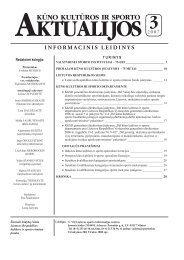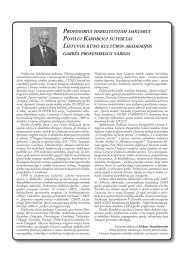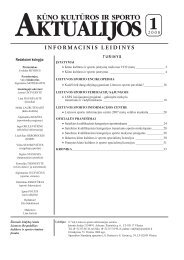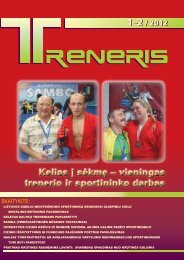Nr. 1 - Lietuvos sporto informacijos centras
Nr. 1 - Lietuvos sporto informacijos centras
Nr. 1 - Lietuvos sporto informacijos centras
You also want an ePaper? Increase the reach of your titles
YUMPU automatically turns print PDFs into web optimized ePapers that Google loves.
2010 <strong>Nr</strong>. 1(59)<br />
33<br />
Discussion<br />
The present study aimed at revealing the coaches’<br />
attitudes towards deception in sports contest. The<br />
factor analysis established five forms of deception.<br />
According to the coaches’ judgment, most common<br />
forms of deception occurring in sport manifest when<br />
athletes try to manipulate the rules of the sports<br />
contest; provoke their opponents in different ways<br />
and use role-playing for the benefit of their team or<br />
themselves. It is of no surprise that during a sports<br />
contest athletes quite often imitate their opponents’<br />
fouls, deliberately waste the time, pretend to be<br />
injured, etc. Though not so often, but there occur<br />
various agreements between the referees and the<br />
leaders of the teams. The least often forms of deception<br />
are athletes’ forward agreements. Such actions maybe<br />
not known to the coaches, but they are quite common<br />
in the sports world (Preston, Szymanski, 2003). They<br />
are simply more difficult to notice. However, other<br />
expressions of athletes’ cheating mentioned above<br />
could be observed in the course of the game. It should<br />
be noted that those actions were mostly justified by<br />
the coaches. We suppose that the coaches treat such<br />
action as part of sports contest. If the actions are<br />
treated as part of other activities, they are treated<br />
favourably. Different unethical and unsportsmanlike<br />
actions become acceptable if the mentality “win-atall-costs”<br />
dominates. In this way sports activities are<br />
as a battle field where the rival becomes defected and<br />
beaten (Coakley, 1994).<br />
It is worth noting that the coaches least of all<br />
justify the forward agreements of referees, team<br />
leaders and sports organizers. This could be explained<br />
by the coaches’ perception of deception and cheating<br />
in sports as they defined it themselves. Many of the<br />
coaches associated deception with the tendentious<br />
decisions of referees and agreements between teams<br />
about the final results of the competition. None of<br />
the respondents linked deception with athletes’ role<br />
playing, attempts to impact referees’ decisions and<br />
provocations against the competitors. It is worth<br />
noting that only a few coaches linked deception<br />
to doping. We do not claim that the coaches are<br />
positive about doping. We suppose that they do<br />
not link the conception of deception with doping.<br />
Besides, research literature contains discussions<br />
about which actions in the sports contest should be<br />
treated as deception and which are simply unethical<br />
actions. Though doping is a most undeniable form<br />
of deception, we would like to agree with L. Hsu<br />
(2005) that not all violations of rules are associated<br />
with deception. Analogically, aggression, violence<br />
and athlete exploitation should not necessarily be<br />
linked with deception.<br />
Analyzing the research findings we should<br />
pay attention to the interaction between the coach<br />
and athletes (especially if they are children or<br />
youngsters). Athletes’ actions in sports activities very<br />
much depend on the coach’s values promoted and<br />
decisions made. M. Guivernau and J. Duda (2002)<br />
have suggested that athlete’s likelihood to display<br />
aggressive behaviour is directly influenced by their<br />
interaction with parents, coaches and teammates. R.<br />
Vallerand, N. Briere, C. Blanchard and P. Provencker<br />
(1997), D. Shields, N. LaVoi, D. Bredemeier and F.<br />
Power (2007) acknowledged that interactions with<br />
social agents (for example, the coach) influence<br />
participant’s understanding of sportsmanship. If the<br />
coaches follow the philosophy “win-at-all-costs”<br />
they accordingly perceive their aims and strive for<br />
them. In this philosophy there can be only one aim –<br />
victory at any cost. If the coach stresses such a win<br />
or lose environment it is argued that cheating and<br />
unsportsmanlike behaviour may likely occur (Miller,<br />
Roberts, Ommundsen, 2004). When coaches convey<br />
an expectation of success at all costs, players could<br />
be tempted to break the rules of the game in order<br />
to satisfy this expectation (Broardley, Kavussanu,<br />
2007). If the coach awards only the athletes who have<br />
produced the best results and ignores other athletes,<br />
antisocial actions in the sport context are encouraged<br />
even more, and in contrast, if the coaches emphasize<br />
personal progress and skill mastery, cooperative<br />
learning and hard work with the aim of improving<br />
skills, they stimulate to engage in behaviour that<br />
benefits others (Kavussanu, 2006). Summing up, the<br />
coaches can influence athletes’ decisions. Athletes’<br />
actions may depend on the coaches’ perceptions of<br />
unsportsmanlike behaviour. Thus, moral development<br />
of young athletes should start from the very beginning<br />
of cognition and perception of moral issues in sport.<br />
Only then it is worth explaining what decisions and<br />
actions are appropriate. So, the coaches’ opinions<br />
that some forms of deception could sometimes or<br />
even often be justified make us give thought to what<br />
actions are treated as part of sports contest.<br />
Limitations of the study and directions for future<br />
research<br />
Evaluating the research we should mention<br />
some of its limitations. First, the sample consisted<br />
of coaches who worked with athletes of different<br />
mastery levels. It would be more appropriate to
















